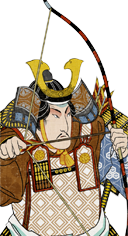
Basic Unit Statistics (can be modified by difficulty level, arts, skills, traits and retainers)
| Recruitment Cost | 700 | |
| Upkeep Cost | 150 | |
| Melee Attack | 14 | 40% |
| Charge Bonus | 6 | 12% |
| Bonus vs Cavalry | 0 | 0% |
| Range | 150 | 23% |
| Accuracy | 60 | 60% |
| Reloading Skill | 60 | 60% |
| Ammunition | 25 | 31% |
| Melee Defence | 6 | 17% |
| Armour | 6 | 40% |
| Morale | 8 | 16% |
Strengths & Weaknesses
- Very good accuracy and reload rate.
- Very good in melee.
- Very good morale.
- Vulnerable to cavalry and massed levy troops.
Abilities
- Flaming Arrows - This unit can fire flaming arrows for a short period of time. Flaming arrows have a greater damage effect and can set fire to flammable objects. Flaming arrows don't function in wet weather.
- Whistling Arrows - Whistling arrows have an unsettling effect on both enemy and friendly troops, reducing their morale and combat ability for a short period when they fly over them.
Requires
Description
Samurai infantry well able to fight in melee and with the bow, making them superb all-purpose warriors.
To be a samurai was, originally, to be a mounted warrior with bow and spear; mastery of the sword and fighting on foot were later developments. However, once adopted, these new ways were treated with equal sincerity and dedication. Samurai infantry are master archers, capable of hitting targets at impressively long ranges, and also quite capable of defeating enemies in close combat. However, the numerically small size of the unit does make them vulnerable to being overwhelmed by numerous lesser enemies. A wise commander also makes sure they are carefully handled when cavalry threaten. War, the skills of war, and the spirits went hand in hand in Japan. According to the "Azuma Kagami", a written account of the Gempei War, Minamoto Yoritomo's first action when summoned to war was to put on ceremonial robes, and bow towards the Iwashimizu Hachiman shrine. By doing this, the Minamoto Shogun placed the destiny of his family in the hands of Hachiman, the kami of war and the Minamoto's tutelary spirit. To make sure Hachiman continued to favour his clan, Yoritomo had a Shinto priest and a samurai "deeply versed in Shinto ritual" offer prayers on his behalf.